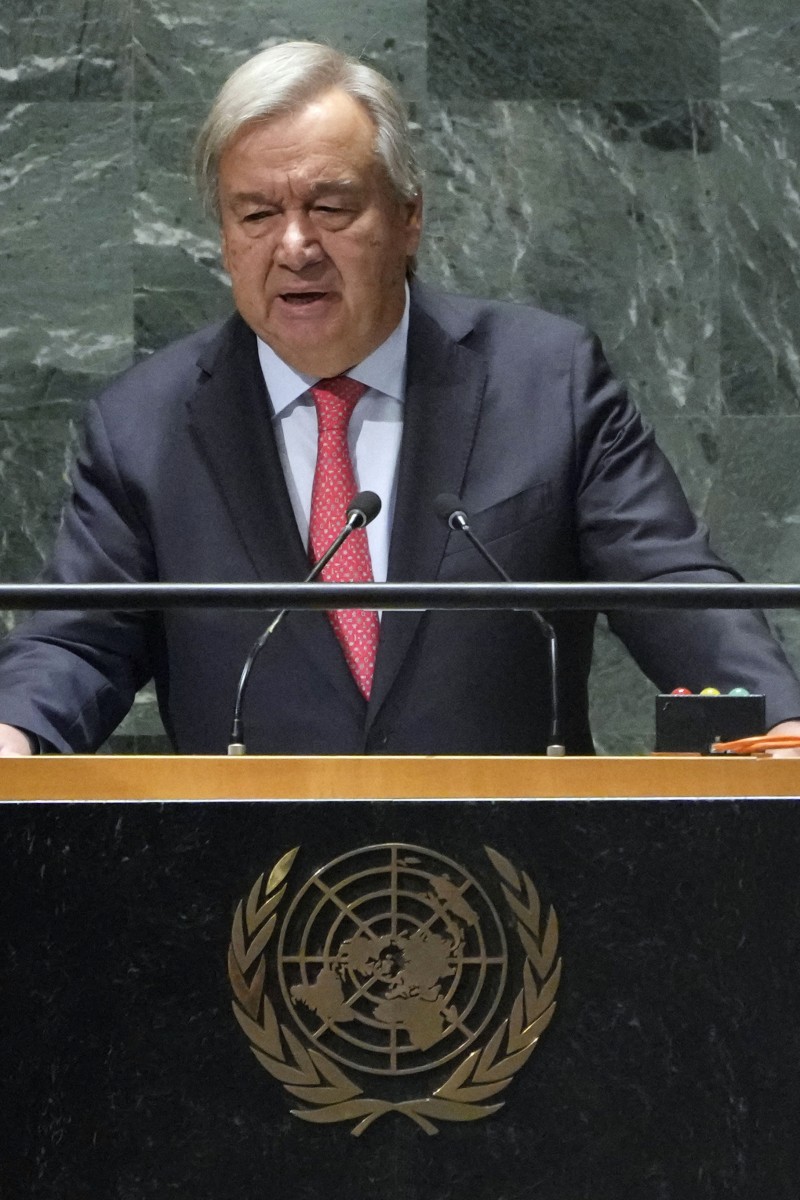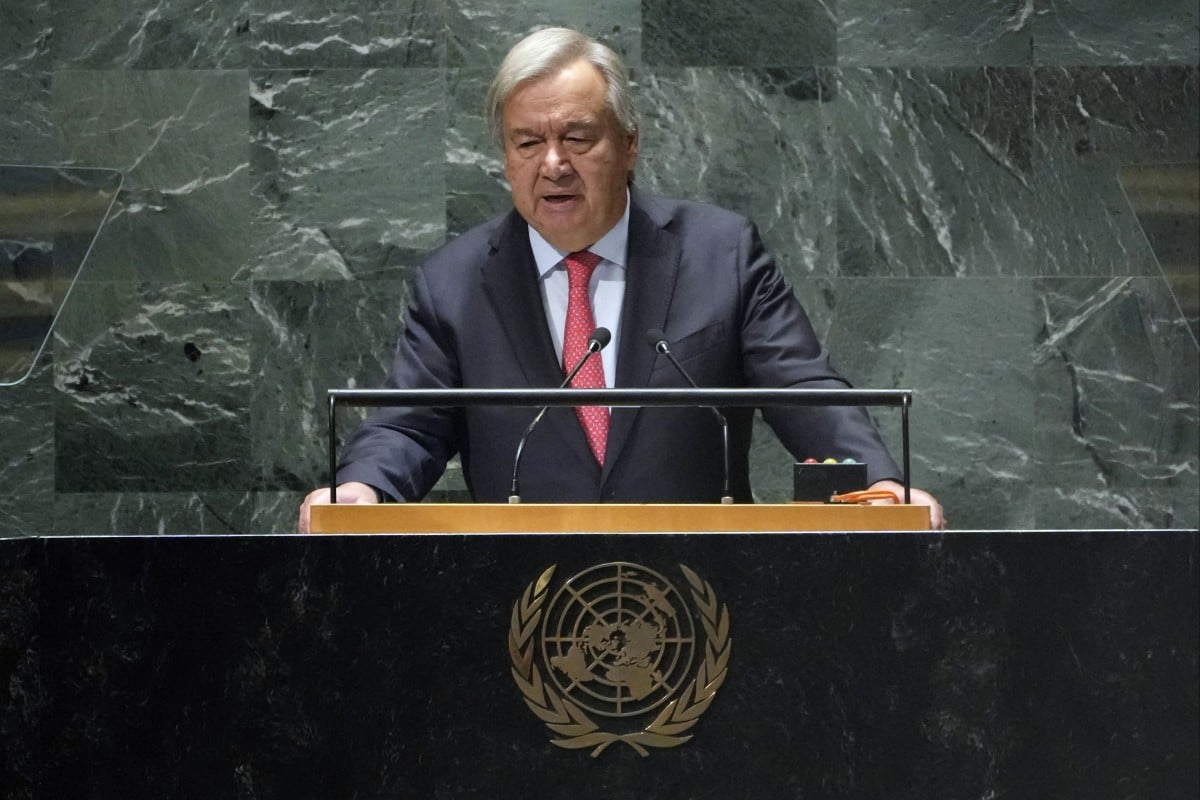
UN chief warns of rising loss of women’s rights, unveils the ‘Gender Equality Acceleration Plan’ to tackle bias
- Antonio Guterres says the gravest situation is in Afghanistan where the Taliban has curbed women from education, employment and most public places
- The Secretary General also spoke of persistent gender-based violence, a pay gap of at least 20% and an underrepresentation in politics
 UN chief Antonio Guterres fears global rollback in women’s rights. Photo: AP
UN chief Antonio Guterres fears global rollback in women’s rights. Photo: APThe United Nations chief has warned that it can take hundreds of years for women to achieve legal equality as the fight for gender non-discrimination is getting more challenging with each passing year. Gross human rights abuses and widespread prejudice are making the fight for justice an uphill struggle.
Secretary General Antonio Guterres told a packed UN commemoration that “a global backlash against women’s rights is threatening, and in some cases reversing, progress in developing and developed countries alike.”
The most egregious example is in Afghanistan, he said, where the ruling Taliban have barred girls from education beyond sixth grade, from employment outside the home, and from most public spaces, including parks and hair salons.
At the current rate of change, legal equality for women could take 300 years to achieve and so could ending child marriage, he said.
Guterres pointed to “a persistent epidemic of gender-based violence,” a gender pay gap of at least 20 per cent, and the underrepresentation of women in politics. He cited September’s annual gathering of world leaders at the UN General Assembly, where just 12 per cent of the speakers were women.
“And the global crises we face are hitting women and girls hardest – from poverty and hunger to climate disasters, war and terror,” the secretary general said.
On International Women’s Day, we bring you some feminist inspiration
In the past year, Guterres said, there have been testimonies of rape and trafficking in Sudan, and in Gaza women and children account for a majority of the more than 30,000 Palestinians reported killed in the Israeli-Hamas conflict, according to the Gaza Ministry of Health.
He cited a report by the UN envoy focusing on sexual violence in conflict that concluded there are “reasonable grounds” to believe Hamas committed rape, “sexualised torture” and other cruel and inhumane treatment of women during its surprise attack in southern Israel on October 7. He also pointed to reports of sexual violence against Palestinians detained by Israel.
Roza Otunbayeva, the head of the UN political mission in Afghanistan, told the Security Council that what is happening in that country “is precisely the opposite” of investing in women and girls.
There is “a deliberate disinvestment that is both harsh and unsustainable,” she said, saying the Taliban’s crackdown on women and girls has caused “immense harm to mental and physical health, and livelihoods.”
Recent detentions of women and girls for alleged violations of the Islamic dress code “were a further violation of human rights, and carry enormous stigma for women and girls,” she said. It has had “a chilling effect among the wider female population, many of whom are now afraid to move in public,” she said.
Otunbayeva again called on the Taliban to reverse the restrictions, warning that the longer they remain, “the more damage will be done.”
University of Hong Kong study reveals men underestimate hurdles faced by women
Sima Bahous, the head of UN Women, the agency promoting gender equality and women’s rights, told the commemoration that International Women’s Day “sees a world hobbled by confrontation, fragmentation, fear and most of all inequality.”
“Poverty has a female face,” she said. “One in every 10 women in the world lives in extreme poverty.”
Men not only dominate the halls of power but they “own US$105 trillion more wealth than women,” she said.
Bahous said well-resourced and powerful opponents of gender equality are pushing back against progress. The opposition is being fuelled by anti-gender movements, foes of democracy, restricted civic space and “a breakdown of trust between people and state, and regressive policies and legislation,” she said.
“We all feel this pushback acutely,” Bahous said. “Our values and principles have never been as challenged as they are today.”
Guterres urged nations to prioritise equality for women and girls. He announced that the UN is launching a “Gender Equality Acceleration Plan” to support governments in designing and implementing policies and spending that respond to the needs of women and girls.
The Lens: Debunk misconceptions to fix gender disparity in organ donors
Bahous drew strong applause when she called for a humanitarian ceasefire in Gaza, which Guterres has long sought as well.
She also urged funding for women and girls, stressing that when this happens economies grow, governments thrive and peace is achieved sooner.
“But in spite of these clear facts, we continue to stubbornly invest in weapons more than we invest in women and girls,” Bahous said.